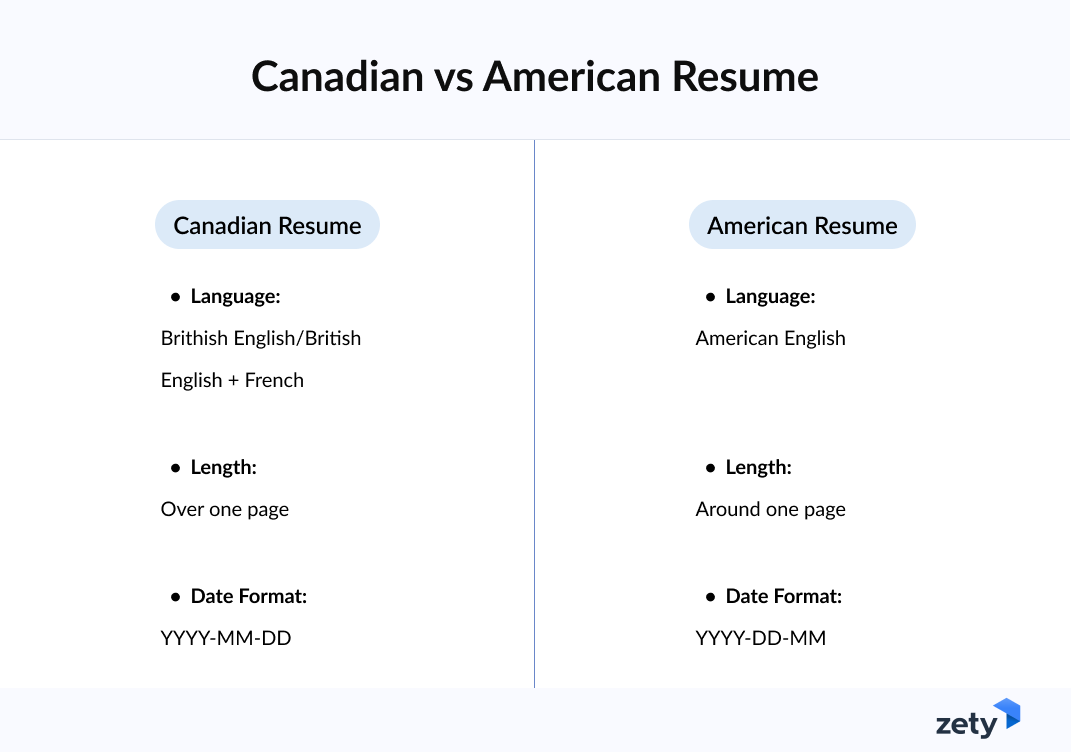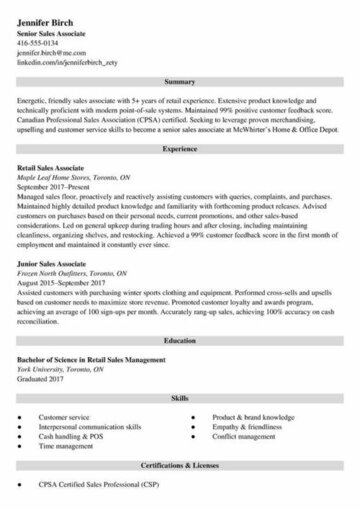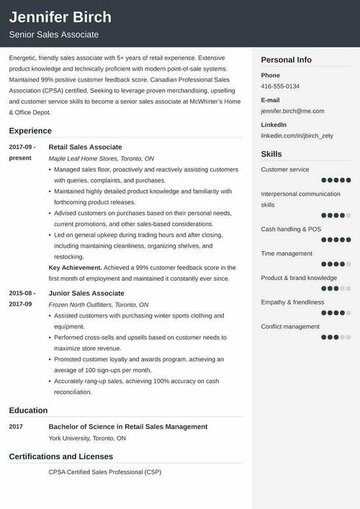How to Write a Canadian Resume: Format & Examples
Create Your Resume NowCanada. Geographic proximity, cultural similarities, plus generous mandated leave and benefits can make Canada a very attractive place to work. But how to get started? What’s the proper Canadian resume format, and is it different from an American one? Check out our Canadian resume template and expert tips to write yours with ease!
This guide will show you the following:
- Canadian resume template you can customize.
- What is the Canadian resume format and how to create one.
- How is the resume format in Canada different from the US format.
- Tips and examples for making an appealing Canadian resume.
Want to save time and have your resume ready in 5 minutes? Try our resume builder. It’s fast and easy to use. Plus, you’ll get ready-made content to add with one click. See 20+ resume templates and create your resume here.
Sample resume made with our builder—See more resume samples here.
Based on an in-depth analysis of 11 million resumes created in our builder, we’ve gathered valuable insights from a diverse range of users across various industries and experience levels. Here are our top findings to help you craft a more effective resume:
Data-Driven Insights From Real-Life Resumes
- 57.84% of resumes created in our builder are longer than 300 words, 28.23% have between 101 and 300 words, while 5.35% have less than 100 words.
- 3.59% of our users have no work experience, while 28.86% declare less than 3 years of work experience.
- The average number of skills added to resumes is 12.56.
- The average job count in the work experience section per resume is 2.61.
Canadian Resume Template
Jennifer Birch
Senior Sales Associate
416-555-0134
jennifer.birch@me.com
linkedin.com/in/jenniferbirch_zety
Summary
Energetic, friendly sales associate with 5+ years of retail experience. Extensive product knowledge and technically proficient with modern point-of-sale systems. Maintained 99% positive customer feedback score. Canadian Professional Sales Association (CPSA) certified. Seeking to leverage proven merchandising, upselling, and customer service skills to become a senior sales associate at McWhirter’s Home & Office Depot.
Experience
Retail Sales Associate
Maple Leaf Home Stores, Toronto, ON
September 2017–Present
- Managed sales floor, proactively and reactively assisting customers with queries, complaints, and purchases.
- Maintained highly detailed product knowledge and familiarity with forthcoming product releases.
- Advised customers on purchases based on their personal needs, current promotions, and other sales-based considerations.
- Led general upkeep during trading hours and after closing, including maintaining cleanliness, organizing shelves, and restocking.
Key Achievement: Achieved a 99% customer feedback score in the first month of employment and maintained it constantly ever since.
Junior Sales Associate
Frozen North Outfitters, Toronto, ON
August 2015–September 2017
- Assisted customers with purchasing winter sports clothing and equipment.
- Performed cross-sells and upsells based on customer needs to maximize store revenue.
- Promoted customer loyalty and awards program, achieving an average of 100 sign-ups per month.
- Accurately rang-up sales, achieving 100% accuracy on cash reconciliation.
Education
Bachelor of Science in Retail Sales Management
York University, Toronto, ON
Graduated 2017
Skills
- Customer service
- Interpersonal communication skills
- Cash handling & POS
- Time management
- Product & brand knowledge
- Empathy & friendliness
- Conflict management
Certifications & Licenses
- CPSA Certified Sales Professional (CSP)
You’ve just seen a perfectly written Canadian resume template. Now learn how to make your own.
Canadian Resume Format Specifics
The best resume format for Canadian jobs is the reverse-chronological resume format, the same as in the U.S. Also called the chronological format, it puts your work experience up front. It’s the format recruiters are most familiar with on both sides of the border.
Here are the sections a typical chronological Canadian resume consists of:
- Resume header with candidate’s name, job title, and contact information
- Resume summary or objective
- Work experience
- Education
- Skills
- Additional sections
Standard Canada resume format also follows the same layout rules as you’d use in the U.S. A good layout ensures that you’ll have a document that looks professional and is easy to read.
Here are some basic resume layout guidelines:
- Set your resume margins to one inch on all sides and double space between sections to create plenty of reader-friendly white space.
- Use line spacing set to 1.15.
- Stick to 1–2 pages for your resume length.
- Choose an easy-to-read resume font.
- Use a larger font size to emphasize your resume section headers and make important information stand out with bolding and italics.
In turn, here are the things you shouldn’t include on your resume in Canada:
- A resume photo
- Private information such as marital status, age, and race
- Salary requirements
- Fake information
And that’s it, you’re all set to craft the perfect Canadian style resume.
Are you applying to an organization requesting a Canadian Common CV? Head here: What You Must Know About Canadian Common CV
Is the Canadian Resume Format Different from the American Resume Format?
 Canada and America have their similarities, but there are plenty of differences too. From the way they do politics to selling milk in bags, the land that gave us Jim Carrey and Justin Bieber can seem like a pretty original place.
Canada and America have their similarities, but there are plenty of differences too. From the way they do politics to selling milk in bags, the land that gave us Jim Carrey and Justin Bieber can seem like a pretty original place.
But do those differences extend to the Canadian resume? See a couple of minor differences between a Canadian resume format and an American resume:
- Language: Canadian resumes might use British spellings, while a typical U.S. resume is written in American English. Some Canadian resumes might also include both English and French languages, particularly in bilingual regions.
- Length: U.S. resumes tend to be limited to one page. On the contrary, Canadian resumes are often extensive and incorporate more details regarding work experience or individual projects.
- Date format: Canadian resumes use the “YYYY-MM-DD” format, while US applications feature the typical “MM-DD-YYYY” format.
Pro Tip: If you live in Europe, Asia, or the Pacific, you probably refer to a resume as a CV. A North American resume is the same as what you call a CV, but to get a better understanding of the two terms, take a look at our guide on the differences between a CV vs a resume.
Making a resume with our builder is incredibly simple. Follow our step-by-step guide, use ready-made content tailored to your job and have a resume ready in minutes.
When you’re done, Zety’s resume builder will score your resume and our ATS resume checker will tell you exactly how to make it better.
How Do You Write a Resume in Canadian Format?
To write a Canadian resume, follow the same rules as people in the U.S. You’ll find detailed advice in our comprehensive how to write a resume guide.
To make a quick start, here’s what sections you should include in your Canadian resume:
1. Add a Header with Contact Information
Include your full name, job title, and contact details. These should consist of your phone number, email address, and LinkedIn profile. There’s no need to include your address on your resume, though. It’s not needed, and it wastes space.
2. Write a Resume Profile
Your resume profile acts as the introduction to the content that follows. The general rule is to use a resume objective if you’re just starting your career and a resume summary if you’re more experienced. A summary of qualifications is another good option if you’ve got plenty of experience and achievements to highlight.
3. List Your Work Experience
This is the most important part of your Canadian resume. 91% of employers prefer their candidates to have work experience, so you need to get your work experience section right to capitalize on that demand. Here’s how to do it:
- Use reverse chronological order, starting with your current or most recent position.
- Start with the basics: your job title, the employer’s name and location, and dates of employment.
- Add up to six bullet points describing the role and start them off with resume action words for added impact.
- Use accomplishment statements to showcase your professional attainments. And don’t just say what you did; prove how well you did it with quantified achievements.
- Include resume keywords to help you pass the applicant tracking systems (ATS) that scan your job application.
Showcase any international experience or cross-cultural skills, especially if you have worked or studied abroad. Canadian employers value diversity and global perspectives, and this can set you apart from other candidates by demonstrating your adaptability and broad understanding of global markets.
4. Mention Your Education
Often overlooked but still necessary. List your degree, the school and its location, and your graduation date (use an expected graduation date if you’re still studying). Only include your GPA on your resume if you’ve just graduated, and it’s 3.5 or above.
If you’ve just graduated, include in your education section two more things: relevant coursework and extracurricular activities.
5. Include a List of Skills
The skills employers look for in a Canadian resume are the same as for the U.S. Be sure to feature a mix of hard skills and soft skills and target your resume to the job. It’s how you keep your skills section relevant and focused.
We reviewed 11 million resumes generated with our builder and identified the top 10 most commonly listed skills:
- Teamwork and Collaboration
- Problem-solving
- Excellent Communication
- Multitasking
- Attention to Detail
- MS Office
- Analytical and Critical Thinking
- Data Entry
- Project Management
- Team Management
6. Make Use of Additional Sections
Extra sections are the icing on the cake, or seeing as this is a Canadian resume, the gravy on the poutine. Adding them gives you the chance to add extra skills and achievements and stand out from other applicants.
Here are some of the best options:
- Hobbies and personal interests
- Foreign languages
- Certifications and licenses
- Projects
- Volunteer work
- Publications
- Achievements and awards
And there’s no need to add references to your resume or even to write “references available upon request.” If an employer needs your references, they’ll ask for them later on in the recruitment process. Including them now is just a waste of valuable page real estate.
Just in case you’re looking for alternative resume templates and formats, we’ve got dedicated guides on them, too:
- 18 Free Resume Templates to Download Now
- Best Resume Templates (14+ Picks for Download)
- 99+ Resume Ideas: Creative, Unique, Gallery
- Traditional Resume Template (5 Classic Examples)
- Eye-Catching Resume Templates: How to Get Noticed
- 20+ Types of Resume: Find the Best For You
- Two Column Resume: 15+ Templates to Download
- Resume Design Templates: 15+ Ideas and How-to
- Good Resume Examples That Get Jobs
Plus, a great cover letter that matches your resume will give you an advantage over other candidates. You can write it in our cover letter builder here. Here's what it may look like:
See more cover letter templates and start writing.
Key Takeaway
Canadian resume format is exactly the same as American resume format. Follow the same guidelines and focus on writing a resume that’s tailored to the job you’re applying for and best shows off your strengths as a candidate. It’s that simple. All the best for your Canadian job search!
Thanks for reading. If you’d like to know more about Canada resume format, please ask in the comments section, and we’ll be happy to help.
About Zety’s Editorial Process
This article has been reviewed by our editorial team to make sure it follows Zety's editorial guidelines. We’re committed to sharing our expertise and giving you trustworthy career advice tailored to your needs. High-quality content is what brings over 40 million readers to our site every year. But we don't stop there. Our team conducts original research to understand the job market better, and we pride ourselves on being quoted by top universities and prime media outlets from around the world.




